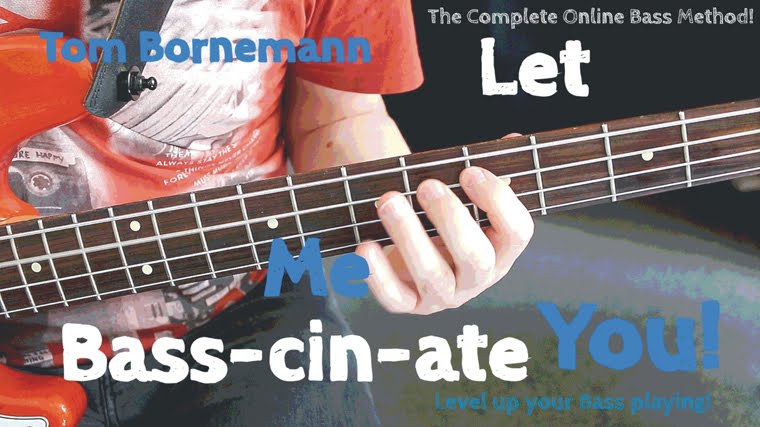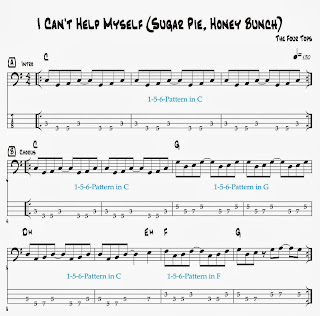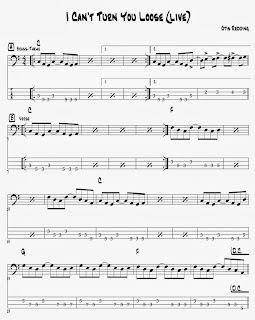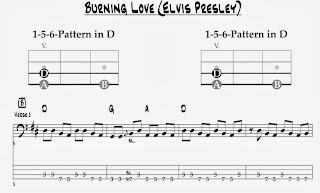The really wonderful tune "Midnight in Harlem" from the Tedeschi Trucks Band is featuring a so-called "line cliché" and here's my little lesson about this harmonic songwriting device.
Line Clichés
A “line cliché” is a melodic line, that moves stepwise against a single chord. There are four common types of “line clichés”:
A) Minor chords with a line descending from the Root (perhaps the most frequently found)
B) Minor chords with a line starting at the fifth and moving up and then down again.
C) Major chords with a line descending from the Root.
D) Major chords with a line starting at the fifth and moving up and then down again.
TYPE A)
The first example of type a shows a “line cliché” against a c minor chord, starting from the root C and descending chromatically to the A (which is the sixth).
A) Minor chords with a line descending from the Root (perhaps the most frequently found)
B) Minor chords with a line starting at the fifth and moving up and then down again.
C) Major chords with a line descending from the Root.
D) Major chords with a line starting at the fifth and moving up and then down again.
TYPE A)
The first example of type a shows a “line cliché” against a c minor chord, starting from the root C and descending chromatically to the A (which is the sixth).
The typical chord progression for this kind of line cliché is:
m - m(Maj7) - m7 - m6
Starting with a minor chord (m) the stepwise descending line leads to a minor chord with a major 7th (mMaj7), a minor chord with a minor 7th (m7) and ends on a minor chord with an added 6th (m6).
A very famous example for this progression is the beginning and the interludes of the Beatles song “Michelle”.
m - m(Maj7) - m7 - m6
Starting with a minor chord (m) the stepwise descending line leads to a minor chord with a major 7th (mMaj7), a minor chord with a minor 7th (m7) and ends on a minor chord with an added 6th (m6).
A very famous example for this progression is the beginning and the interludes of the Beatles song “Michelle”.
The line cliché is stepping down chromatically from the root: F-E-Eb-D.
Here the bass is not involved in the “line cliché” as Paul McCartney chose the option of playing a counter-part on bass:
Here’s another song with a “type a” line cliché:
In the course of the song there’s another type a “line cliché” with semi-chromatic movement as the line steps down a whole tone from root to minor 7th and then a half-tone to the sixth: A-G-F#-G.
Here's the complete bassline to "Into The Great Wide Open".
Observe the different strategies bassist Howie Epstein is applying here to play with or against the line clichés of the guitar.
- During the Intro and the Em part of the verses he simply plays the root note E as a pedal tone.
- On the Am (bars 7+8; 16+17 and 38+39) he follows the line-cliché by playing A-G-F#-G.
In the second part of the second verse however he plays a counter-part to the line: F#-G-A-C. - In the Interlude (Part D, bars 30-34) he plays 2 bars with the line-cliché (E-D#-D-C#) and 2 bars counterpart (E-F#-G-A).
Another semi-chromatic line cliché descending from the root can be found in the Beatles song “Dear Prudence”: D-C-B-Bb.
Here's a clip with the isolated bass and drums for closer study of the bassline:
Now let's move on to another type of line clichés:
Type B)
This line clichés moves chromatically up from the 5th of a minor chord to the sixth and then back down:
This one has been made really famous by John Barry’s “James Bond Theme”:
Next week we'll going to have a closer look at line cliche types c+d and of course I'll present the transcription of "Midnight in Harlem" by the Tedeschi Trucks Band.

7+-+Cm7+-+Cm6+(Type+A).jpg)
+-+Cm6+-+Cm(%235)+(Type+B).jpg)



.jpg)

